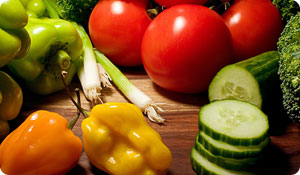
Scientists have been accumulating evidence that a poor diet is a strong risk factor for colon and rectal cancer (colorectal). A new study provides additional, convincing support.
Researchers found that dietary fiber and the density of fiber consumed (fiber intake density) are inversely associated with risks for colorectal and colon cancer. The study participants who consumed the highest levels of fiber and fiber density intake had a lower Body Mass Index (BMI), weighed less, smoked less, consumed more energy and folate (a vital nutrient) and drank less alcohol-all markers of good health-than those who consumed the lowest levels of fiber.
What is Fiber and Why is it Important?
Dietary fiber (roughage or bulk) is the part of the plant that your body cannot digest or absorb. Fiber moves food through your digestive system and increases stool bulk, making it easier to eliminate waste.
Consuming adequate fiber helps maintain healthy bowels and prevents disease, such as colon cancer. Fiber helps you lose weight, or maintain a healthy weight, by fueling your body with fewer calories while still satisfying your hunger. Since obesity is a high risk factor for colon cancer, getting enough fiber is doubly important.
Clean Eating for Colon Health
The American Institute for Cancer Research (AICR) estimates we could prevent 45 percent of colon cancer cases through diet, physical activity, and weight management. Fortunately, eating right for colon health is easy.
The AICR recommends that you add cancer protection foods to your diet. This includes plant-based foods such as fruits, vegetables, whole grains, legumes, seeds, and nuts. Plant foods contain loads of phytochemicals, naturally occurring chemicals that enhance your immune system, reduce inflammation, and prevent DNA damage, which is linked to cancer development. Different plants provide different nutrients, so eat a wide variety of food for maximum colon cancer prevention.
Use independent nutrition guides and learn to read food labels to ensure you get enough fiber in your diet. The National Academy of Sciences' Institute of Medicine recommends 38 grams of fiber daily for men younger than 50, and 25 grams for women, (30 grams and 21 grams, respectively, for those 51 and older).
Other recommendations include consuming less than 90 grams of red meat daily, eating five servings of fruits and vegetables every day, and limiting your alcohol consumption.
Colon cancer is the third most common cancer in the world. Reduce your risk by making a few simple lifestyle and diet modifications.
Sources
"Landmark Policy Report: Many Cancers Could Be Prevented In the US and Across the Globe." American Institute for Cancer Research. Web. 26 February 2009.
http://www.aicr.org/site/News2?abbr=pr_&page=NewsArticle&id=14613&news_iv_ctrl=2461
"Fruits and Vegetables Benefits." Center for Disease Control. Web.
http://www.fruitsandveggiesmatter.gov/benefits/index.html
Dahm, Christina C., Keogh, Ruth H., Spencer, Elizabeth A., Greenwood, Darren C., Key, Tim J., Fentiman, Ian S., Shipley, Martin J., Brunner, Eric J., Cade, Janet E., Burley, Victoria J., Mishra, Gita, Stephen, Alison M., Kun, Diana, White, Ian R., Luben, Rober, Lenties, A.H., Khaw, Kay Tee, and Rodwell, Sheila A. "Dietary Fiber and Colorectal Cancer Risk: A Nested Case-Control Study using Food Diaries." Journal of the National Cancer Institute 102(9) (2010): 614-626. Web. 15 July 2010.
http://www.medscape.com/viewarticle/723854
"Dietary fiber: Essential for a healthy diet." Mayo Clinic. Web. 19 November 20009.
http://www.mayoclinic.com/health/fiber/NU00033
Chustecka, Zosia. "Lifestyle Changes Could Prevent More Colorectal Cancer Than Screening." European Journal of Cancer Prevention. Medscape Medical News.Web. 10 April 2009. http://www.medscape.com/viewarticle/590919





